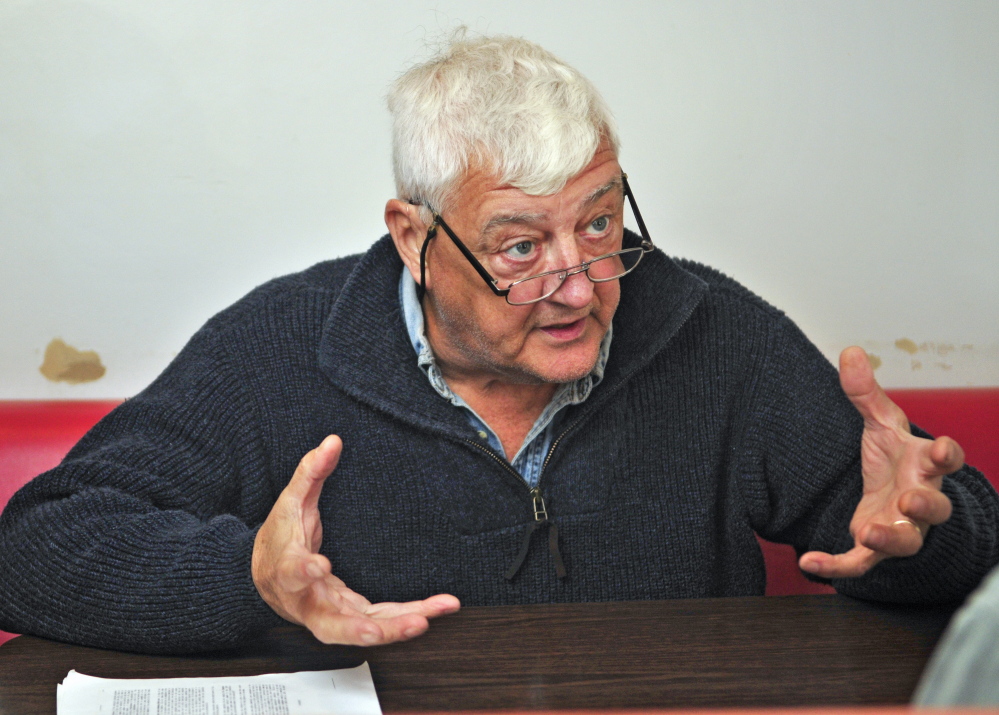Residents of Gardiner will have two very different candidates for mayor to choose from in November — an outspoken former city councilor who says the city is wasting money and the current mayor who says he’s excited for Gardiner’s future.
Mayor Thomas Harnett won an uncontested race two years ago, but this year George Trask, a former city councilor, is looking to win the mayorship by focusing on the city’s taxes, which are some of the highest in the county.
Two significant differences between the candidates are their views on future development in the city and whether the city should be giving money to nonprofit organizations such as Gardiner Main Street and Johnson Hall Performing Arts Center.
However, the starkest contrast might be their approaches to the job.
The position of mayor in Gardiner is essentially to serve as a member and chairman of the City Council, so neither candidate could singlehandedly make any changes. But the mayor does set the tone for meetings and often serves as the face of the city at public events.
When asked at a candidate forum last week how he would make himself available to all residents, Trask, 60, a retired builder and business owner, spent most of his two minutes listing ways the city could save money.
“I don’t sugarcoat things. I’m not a politician,” Trask said, turning and motioning toward Harnett. “I can tell you that right now I’m not a politician. I’m a taxpayer. I’m a person that looks out for everybody.”
Harnett, 59, an assistant attorney general for the state, said he sees one of his most important duties as serving as a cheerleader for the city, showcasing its assets and what it can provide to new residents and new businesses. He often attends community events and speaks on behalf of the city.
“If one is out there simply saying, ‘We do this wrong, we’ve done that wrong, we’ve tried this before, nothing is going to work, downtown is dead, we shouldn’t throw any money at it,’ to me that’s not leadership. That’s a recipe for disaster,” Harnett, of Marston Road, said during a recent interview. “And I think it is my job to place Gardiner in the best light possible in as many settings as possible.”
Harnett said the city has done a great job of cutting department budgets in recent years, but there isn’t much left to cut without eliminating services.
“I’m excited about what we’re doing. I’m excited about the future,” he said. “I don’t want to see retrenchments. I don’t want to see services cut.”
Trask, who butted heads with Harnett at times during City Council meetings this year, criticized his opponent in a recent interview for focusing on the downtown too much and spending time lobbying the state to restore municipal revenue.
“The job at hand for the mayor is to grow this city, and that’s my intent,” Trask, of Libby Hill Road, said during a recent interview. “I’m tired of the cost of operating this city being completely dumped on the back of residential taxpayers.”
Trask’s plan for growing the city is to reduce taxes and increase development on outer Brunswick Avenue, U.S. Route 201, heading toward the interstate. He thinks the city focuses too much on the downtown and filling its business park off of Route 201, Libby Hill Business Park.
Trask called the downtown a “revolving door” of businesses and said that wouldn’t be the case if the city had more development out on Route 201 and a larger population. He said the city can’t support many downtown businesses with its population, which dropped from about 7,000 to less than 5,800 between 1990 and 2010.
“We’ve been doing the same thing for 30 years. Now’s time to make a change,” Trask said.
Trask didn’t have specific changes in mind to attract business to Route 201, but he said he would be open to providing tax breaks by creating tax-increment financing districts for some businesses. He said the city’s economic and community development director, Nate Rudy, is holding the city back.
“He’s not aggressive enough,” Trask said of Rudy. “When it comes to drawing business to this city, they can brag about bringing a donut shop, they can brag about bringing a marijuana dispensary, they can brag about bringing a slaughterhouse. How many jobs, good paying jobs, are those things going to bring to this city?”
Rudy, in a phone interview Friday, said the city’s plan for that area, as outlined in the recently updated comprehensive plan, is to develop Brunswick Avenue with more industrial businesses closer to the interstate and mixed-used businesses closer in town.
“I think there’s this idea that somehow if a community goes out and begs business to come, that they’re just going to capitulate and show up,” Rudy said.
“No one can wave a wand and magically fill a corridor with new business,” he added. “And I would say anybody that thinks that can be done has a fundamental misunderstanding of how economic development works.”
The issue of downtown development is tied to the city’s contributions to nonprofit organizations because two groups that make up 40 percent of the total contributions, $25,000 each — Gardiner Main Street and Johnson Hall Performing Arts Center — are central to the city’s downtown goals.
Trask, who previously called the city spending money downtown as “an absolute waste of money,” said he doesn’t think the city should give money to nonprofit organizations. He said people should get to choose whether they want to give to the groups.
“Don’t take it out of my tax money. Don’t tell me how to spend my money,” Trask said. “That’s just not right. They’ll make it on their own with community support, or they just won’t make it. Period.”
Harnett, on the other hand, thinks the downtown is critical to the city’s future success.
“Without a downtown, there’s no character to Gardiner,” he said.
Both Gardiner Main Street and Johnson Hall “return an incredible amount of value to the city,” Harnett said.
“I think we get far more than $25,000 in value, and I think it’s important to look at both sides of the equation. Not just what it costs, but what does it bring to the community,” he said.
Another issue that emerged during the candidate forum last week is whether the city should try to leave the Kennebec Regional Development Authority, a group of 24 central Maine communities formed 15 years ago to build a business park in Oakland. As of July 2013, the 24 communities had invested $6.9 million in FirstPark, the regional business park, and got back just under $1.8 million. Gardiner has lost more than $300,000 in that time period.
The legislation that created the development authority required town meeting votes or city election referendums to approve communities joining the group, but Gardiner approved it with a City Council vote in May 1999.
In 2008, the city’s attorney advised then-City Manager Jeffrey Kobrock if there was an error in how the city joined the development authority, it’s unlikely the courts would invalidate the city’s membership or let the city off the hook for its portion of the outstanding debt incurred to build the park.
Trask, who was on City Council when this issue was brought up in 2010, thinks Gardiner deserves all of its money back and said the city should fight it in court.
“I wouldn’t take the word of a lawyer,” Trask said. “I would take the word of a judge, and let the judge make the decision of whether we are legally bound by this or not.”
Both Trask and Bryan Blanchard, a city councilor when the attorney reviewed the issue in 2008 and the husband of a candidate for City Council, spoke at length at the candidates’ forum.
Harnett pointed out that the city’s representative to the group, Rudy, has been a staunch critic of the development authority’s spending, and that both Trask and Blanchard were previously on the council when the issue was raised.
“To come into a hearing or a candidates’ forum four years later and raise the issue that we have somehow been negligent in our obligation to me is ironic at best and disingenuous at worst,” Harnett said. “You simply cannot have been there and made a decision not to bring legal action and then say, ‘I can’t believe you guys are not spending $100,000 to sue,’ which to me would be fiscally irresponsible.”
Paul Koenig — 621-5663
Twitter: @paul_koenig
Copy the Story LinkSend questions/comments to the editors.




Success. Please wait for the page to reload. If the page does not reload within 5 seconds, please refresh the page.
Enter your email and password to access comments.
Hi, to comment on stories you must . This profile is in addition to your subscription and website login.
Already have a commenting profile? .
Invalid username/password.
Please check your email to confirm and complete your registration.
Only subscribers are eligible to post comments. Please subscribe or login first for digital access. Here’s why.
Use the form below to reset your password. When you've submitted your account email, we will send an email with a reset code.